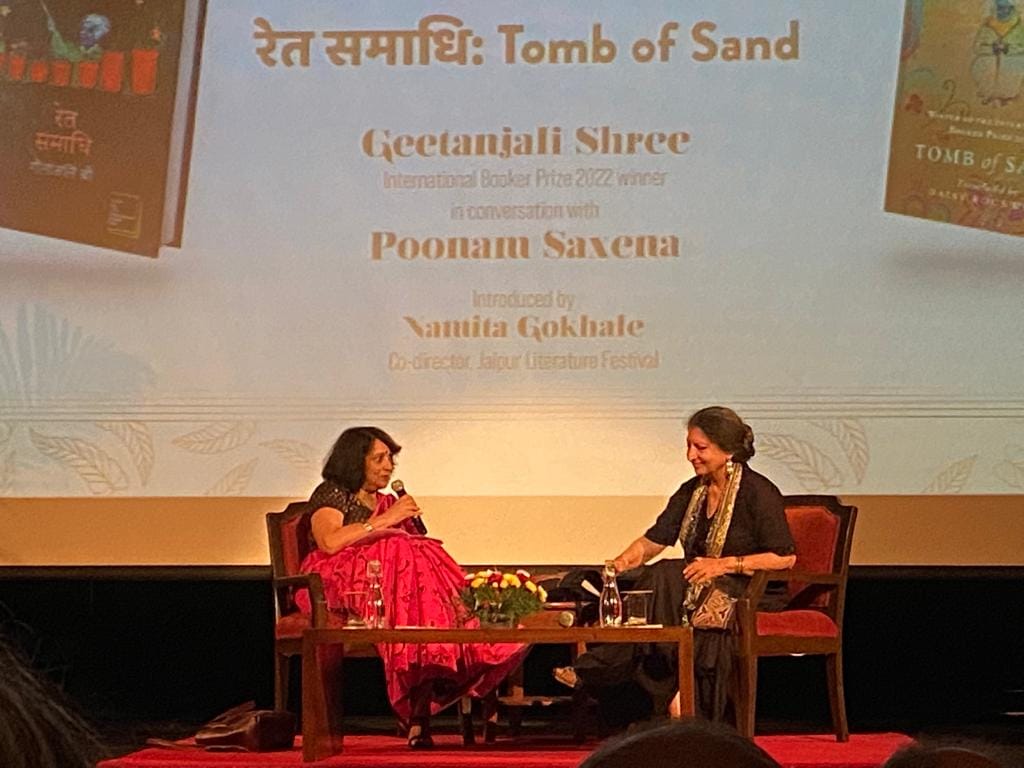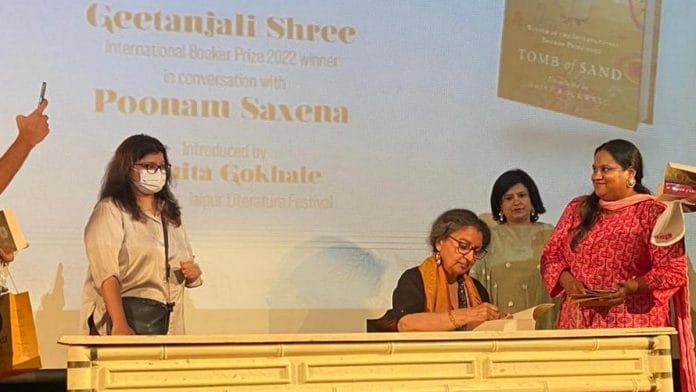New Delhi: The visual of an older woman occupying a cot and facing a dull, peeling wall is not rare in the Indian context. Geetanjali Shree, the International Booker-winning author of Tomb of Sand, says that this ‘common’ optic intrigued her to a point where she was forced to engage with it.
“As common as these images are, the exact opposite, too, exists. And I wanted to bring that to the fore,” Shree said while addressing a hall packed with an ever-eager audience in New Delhi’s India Habitat Centre Tuesday. She was also reminded of her idol, Hindi literary giant Krishna Sobti, who had a “spring in her step till the very end.”
Tomb of Sand, translated from Hindi, traces the journey of its octogenarian protagonist, Ma, who battles depression after losing her husband and insists on facing her Partition-induced trauma by visiting Pakistan. However, as central as this theme is to her book, it is not “Partition with a capital P,” Shree told journalist and writer Poonam Saxena. Instead, Tomb of Sand celebrates “a lust for life” that continues to grow despite the constraints of age and health. And Partition only serves as a binding factor in this narrative—much like the flour in Shree’s beautifully described ‘Pakoras’.
“She [Ma] will be reminded of what she used to do. But now, as they remind her of that life, it feels as if she is not living it herself, the living is being done to her. She is being turned into Pakoras. Moistened, ground, grated, cut into pieces, reclining in boiling oil eek eek flip flop sliding into bellies and disintegrating,” reads an excerpt from this incredible tale of an older woman re-evaluating her role as mother, daughter, woman, and feminist after the death of her husband.

Also read: Ret Samadhi Booker marks ‘dawn’ of Hindi literature, say writers, chance to showcase more works
A celebration of elderly women
Tomb of Sand is not a ‘typical Partition novel’ like Khushwant Singh’s Train to Pakistan or Bhisham Sahni’s Tamas. Instead, it is the story of countless women coming to terms with their identity and sexuality within the traditional setup of an Indian family, particularly those inching towards the end of their life.
In India, an older person is often portrayed as leading a drab existence, seemingly counting their days and struggling to assemble what little is left of their joy, hope and enthusiasm while recounting experiences—harrowing and joyful—that have brought them to this day. Be it in movies or life. And this is not just a mere assumption. For instance, the National Library of Medicine claims that a 2011 analysis of 74 studies on 4 lakh-plus elderly subjects showed a comparatively higher rate of geriatric depression in India—about 21.9 per cent. And as of 2019, says BMC Public Health, depression rates among the elderly are as high as 34.4 per cent. It just so happens that Shree has used her brilliant storytelling skills to bring these somewhat dull and insipid statistics to life—in the form of the disgruntled yet extraordinary ‘Ma.’
And it’s not just Ma, Shree says her book celebrates women like her and Krishna Sobti, and points out the irony of our bodies being unable to keep up with our passion for life.
“As a person and writer, (Sobti) was absolutely stupendous. She wrote with honesty and freedom of thought, and didn’t get into what was politically correct and what wasn’t. Her fearless spirit inspired me, and if I can imbibe even a bit of that, I will pat myself on the back,” Shree told ThePrint.
Also read: Geetanjali Shree won 1st Booker for Hindi novel. Regional authors must ask for right price now
A unique style
Shree expresses these ideas in a rhythmic and musical language—in a style that isn’t easily understood. But where is the problem, she asks “Literature is not a ‘samosa’ that can be gulped and digested in a second. Critical thinking is necessary, and it is okay if you don’t understand. We must savour this confounding aspect. Literature allows you to think anew and get shaken a little bit.”
Shree adds that her dabbling in theatre allowed her to express her ideas in a less-than-conventional manner. “Words have their own charm and personality. So, in deference to language, I move with it, and the power of language takes over while I’m writing,” Shree told Saxena.






